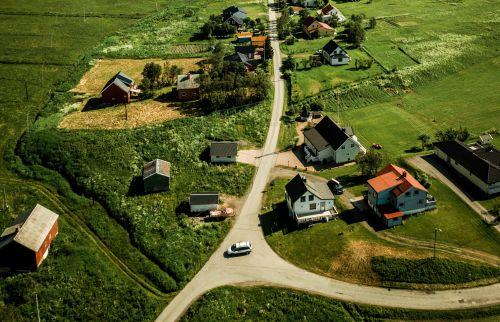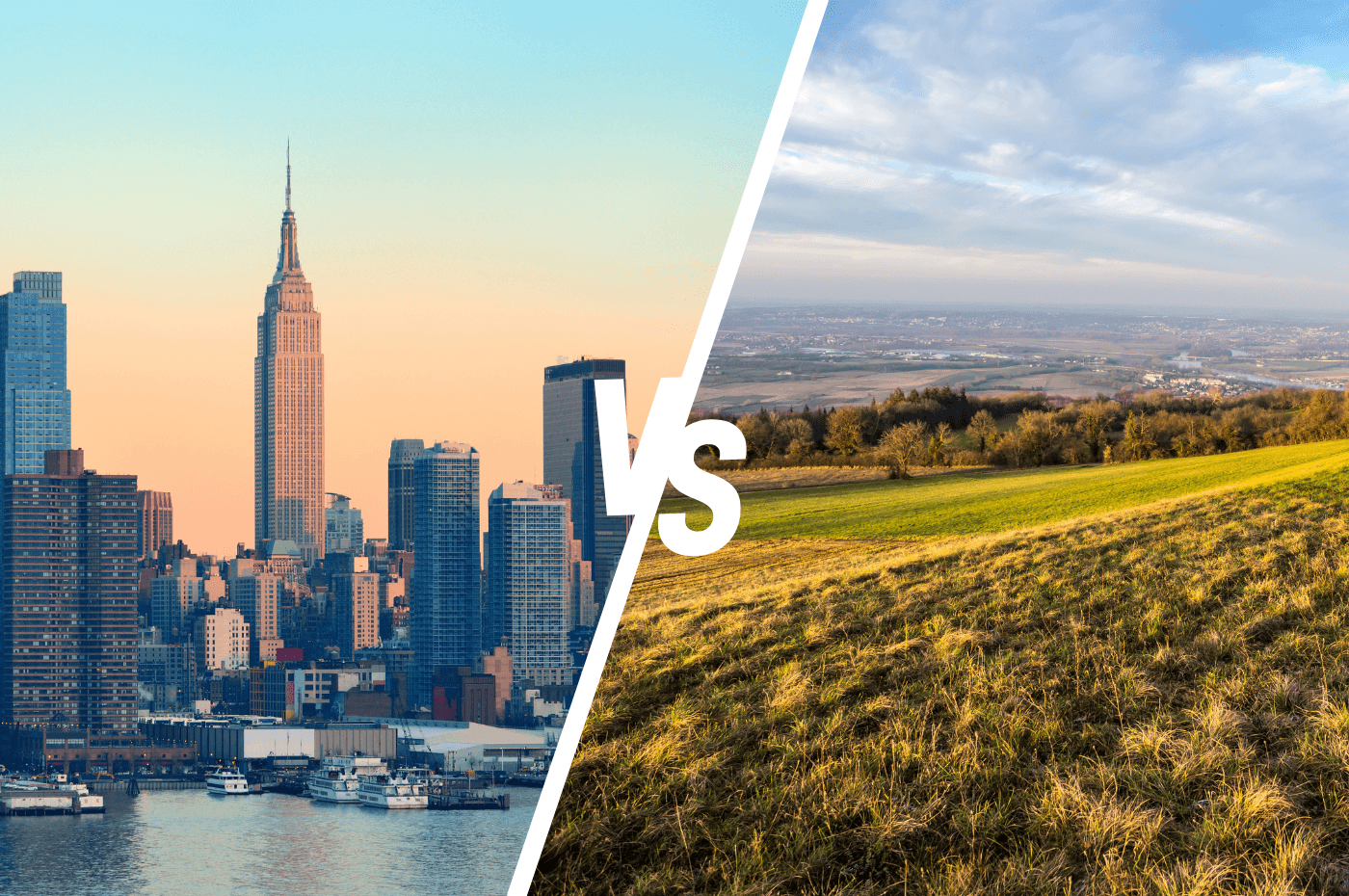Buying a house is one of the most important decisions of your life, often accompanied by a mix of thoughts and concerns. Among the many questions to consider, one stands out: do you want to live in the city or the countryside?
While the city draws you in with its energy and amenities, the countryside offers a peaceful lifestyle and closeness to nature. Each option has its own pros and cons, which you should carefully weigh to determine what suits you best.
Here’s a quick overview.
Living in the city: advantages and disadvantages
The city has long been a popular choice, attracting young families, students, retirees, and employees. This is no coincidences, as cities, with their varying population density, offer numerous benefits.
Proximity to services
Purchasing a house, condo, or apartment in the city means you'll have easy access to a wide range of services. From essential amenities like grocery stores and pharmacies to entertainment options such as theatres and restaurants, everything is typically located nearby.

Reduce commuting time
Living in the city helps minimize the time spent commuting between your home and workplace. Being closer to economic hubs improves your quality of life and allows you more energy to enjoy your free time.
Professional opportunities
The city also provides a wealth of professional opportunities. With a diverse range of jobs across various sectors, you'll often find better-paying positions.
Numerous sources of entertainment
The city offers a wealth of activities to enjoy. As a vibrant place, there's always something to do or explore. From libraries and museums to parks, public swimming pools, and sports clubs, both the young and the old can find something that suits their interests.
Public transport accessibility
Living in the city also provides easy access to public transportation. Buses, subways, and options like walking and cycling are commonly used modes of travel. This allows you to reduce your daily reliance on a car, though having one can still be useful for longer trips or vacations.

Reduced space
One downside of city living is that it often means smaller living spaces. Homes tend to be less spacious, and plots of land are narrower, if there’s even an outdoor area available.
Higher cost
In addition to being smaller, housing in the city is generally more expensive compared to larger homes in the countryside. In urban areas, condominiums are often the most affordable option, though they come with their own set of challenges.
Stress and pollution
Living in the city often brings stress due to the urban environment. Noise pollution from sirens, car horns, and construction, along with high population density and a fast-paced lifestyle, can impact both mental and physical well-being.
Moreover, air pollution from traffic and industrial activities can negatively affect health, increasing the risk of respiratory and cardiovascular diseases.
Buying a house in the countryside: advantages and disadvantages
Unlike the city, the countryside has become less popular in recent years. However, the pandemic shifted many people's priorities. The lockdown in March 2020 had a lasting effect, making people crave more space. In the years that followed, there was a noticeable shift towards living in peripheral areas.

More affordable properties
With real estate prices in the city soaring, the countryside generally offers more affordable properties, despite recent increases in housing costs. This makes it possible to buy a primary residence at a lower price.
Larger space
Living in the countryside also provides the advantage of more space: larger plots of land and more spacious homes. This allows you to enjoy fresh air every day without leaving your property. Moreover, you can appreciate the surrounding landscape and nature.
No traffic
If you're not fond of driving in heavy traffic, the countryside offers the benefit of avoiding road congestion and jams. Traffic is lighter and, more importantly, much smoother.
More peaceful life
The countryside is synonymous with peace and quiet. Without the noise of car horns, traffic jams, or the hustle and bustle of the city, you can enjoy a tranquil environment that promotes serenity and better mental health.

Far from essential services
Living in the countryside, however, means more limited access to essential services. Unlike in the city, where everything is within reach, you may need to travel a considerable distance to reach the grocery store, shops, schools, gyms, and other services.
This makes it important to carefully consider whether this distance is manageable for you before deciding to buy a house in the countryside.
Greater reliance on the car
With limited access to public transport, the car becomes the primary mode of transportation for your trips. As a result, you'll need to account for the additional cost of driving and maintaining a vehicle.
How to choose: criteria to guide your decision
Still undecided? To make the best choice for your situation, it’s important to evaluate your needs, finances, and preferences.
What are your priorities?
Your decision should primarily be guided by your preferences and lifestyle. Ask yourself the following questions:
- Do you enjoy excitement or tranquility? If you thrive in a lively environment, the city might be a better fit. However, if you prefer peace and quiet, the countryside is ideal.
- Do you need space? If you’re planning to start a family, the countryside offers larger homes and spacious plots. For singles or couples, the city provides more compact housing, often in prime locations.
- How important are amenities to you? Proximity to shops, schools, hospitals, and public transportation may be deciding factors, especially in urban areas.
What is your budget?
Your budget plays a crucial role in your decision-making process. Consider not only the purchase price but also the ongoing costs involved:
- Purchase and maintenance costs: city homes tend to be more expensive, with higher municipal taxes. In contrast, while properties in the countryside are typically more affordable, larger properties or land may require more maintenance.
- Indirect costs: living in the countryside could lead to additional costs such as fuel, vehicle maintenance, and tolls. In the city, even if you rarely use your car, you may still face public transportation or parking fees.
- Local real estate market: research the market where you plan to buy. Fluctuations in property prices can influence your decision.
What does your lifestyle and long-term plan look like?
Your current lifestyle and future plans should also influence your decision:
- Work and commuting: are you working remotely, or do you need to go to the office regularly? If you work on-site, the city can help reduce commuting time. However, if you work remotely, the countryside could provide the calm and space you desire without sacrificing your job.
- Family and children: if you plan to have children, you may prioritize a peaceful environment, nearby play areas, and good schools. However, the city often offers more variety in activities for families.
- Social and cultural life: do you enjoy going out regularly, attending cultural events, or participating in clubs and associations? These activities are typically more accessible in the city. In the countryside, social life tends to be more intimate, but it may require more effort to connect with others.
- Health and well-being: if you seek a setting that promotes relaxation and well-being, the countryside might be a better choice. While the city is dynamic, it can sometimes feel overwhelming for those sensitive to stress or noise.
Finding the right balance is possible!
If neither the city nor the countryside fully matches your lifestyle, remember that you don’t have to choose between the two. Small suburban towns or peri-urban areas often offer the best of both worlds: more spacious housing than in the city, access to local services, and a connection to nature.
And to help you find the property of your dreams, whether in the city, the countryside, or the suburbs, don’t hesitate to contact a real estate broker. This professional can help you find the ideal home based on your needs and preferences.
FAQ about life in the countryside vs. the city
-
Is it better to live in the city or the countryside?
There’s no definitive answer to this question; it all depends on your priorities! That’s why it’s important to carefully weigh the pros and cons of each option to make the best choice for your situation.
-
Why is it better to live in the countryside?
Living in the countryside isn't necessarily the best choice for everyone. However, it offers several advantages, such as a more peaceful lifestyle, larger spaces, and often lower property purchase costs, which are significant benefits for many.
-
What’s the difference between living in an urban or rural area?
The differences are significant. Generally, cities are known for their density, services, and dynamic atmosphere, while the countryside is characterized by spaciousness, nature, and tranquility.
-
What’s the life expectancy in the city vs. the countryside?
Studies on this topic vary, but it’s believed that the less stressful environment and better air quality in the countryside can contribute to a higher life expectancy compared to urban areas.
Are you looking to buy a house?
XpertSource.com can help you find a real estate broker. When you tell us about your project, we put you in touch with qualified resources for free. Simply fill out our form (it only takes a few minutes) and we will connect you with professionals.

